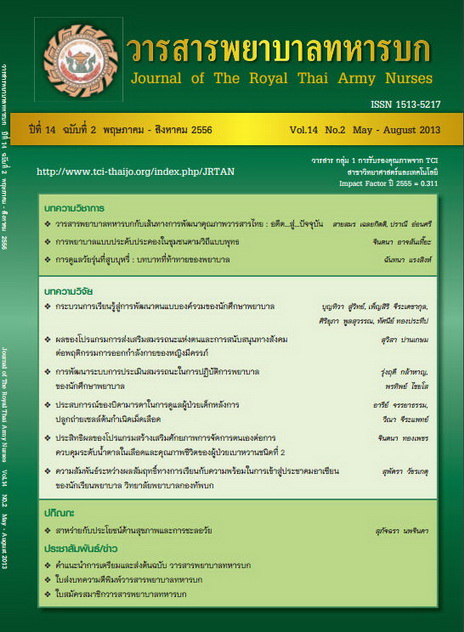ประสบการณ์ของบิดามารดาในการดูแลผู้ป่วยเด็กหลังการปลูกถ่ายเซลล์ต้นกำเนิดเม็ดเลือด Experiences of Parents in Caring for Pediatric Patients after Hematopoietic Stem Cell Transplantation.
Keywords:
บิดามารดา, การดูแล, ผู้ป่วยเด็ก, การปลูกถ่ายเซลล์ต้นกำเนิดเม็ดเลือด, ประสบการณ์, Parents, Caring, Pediatricpatients, Hematopoietic stemcelltransplantation, ExperienceAbstract
บทคัดย่อ
การวิจัยเชิงคุณภาพ ตามแนวคิดปรากฏการณ์วิทยาของ Husserl นี้ มีวัตถุประสงค์เพื่อบรรยายประสบการณ์ของบิดามารดาในการดูแลผู้ป่วยเด็กหลังการปลูกถ่ายเซลล์ต้นกำเนิดเม็ดเลือด ผู้ให้ข้อมูลคือบิดามารดาของผู้ป่วยเด็กอายุ 1-16 ปี ที่มีประสบการณ์ในการดูแลผู้ป่วยเด็กในระยะเวลา 9 เดือนแรกหลังการปลูกถ่ายเซลล์ต้นกำเนิดเม็ดเลือด เก็บรวบรวมข้อมูลโดยใช้วิธีการสัมภาษณ์แบบเจาะลึกร่วมกับการบันทึกเทป ข้อมูลอิ่มตัวจากผู้ให้ข้อมูลจำนวน 14 ราย นำข้อมูลที่ได้มาถอดความแบบคำต่อคำ วิเคราะห์ข้อมูลตามวิธีของ Colaizzi
ผลการวิจัยพบว่า ประสบการณ์ของบิดามารดาในการดูแลผู้ป่วยเด็กหลังการปลูกถ่ายเซลล์ต้นกำเนิดเม็ดเลือด ประกอบด้วย 4 ประเด็นหลัก ดังนี้1)ต้องดูแลอย่างเข้มงวดและใส่ใจอย่างใกล้ชิดในเรื่อง การรับประทานอาหาร ดูแลความสะอาดเป็นพิเศษ การรับประทานยากดภูมิ ดูแลสายสวนหลอดเลือดดำ จำกัดการพบปะผู้คน และติดตามการรักษา2) ต้องร่วมมือกัน โดยผู้ป่วยเด็กต้องร่วมมือ ครอบครัวต้องช่วยกัน แพทย์และพยาบาลต้องช่วยด้วย 3) กำลังใจเป็นสิ่งสำคัญประกอบด้วย กำลังใจจากผู้ป่วยเด็ก สร้างกำลังใจให้ตนเอง กำลังใจจากครอบครัวและกำลังใจจากแพทย์และพยาบาล 4) หลากหลายความรู้สึกของบิดามารดา ทั้งความรู้สึกที่เป็นทุกข์และความรู้สึกที่เป็นสุข
ผลการศึกษาวิจัยครั้งนี้ ให้ภาพสะท้อนถึงประสบการณ์ของบิดามารดาเผชิญในการดูแลผู้ป่วยเด็กหลังการปลูกถ่ายเซลล์ต้นกำเนิดเม็ดเลือด ที่ให้ความสำคัญต่อการดูแลและสามารถปฏิบัติตามแผนการรักษาได้ โดยมีปัจจัยขับเคลื่อนคือความร่วมมือและกำลังใจของทุกฝ่ายที่ร่วมในปรากฏการณ์ของการดูแล ถึงแม้ในเวลาที่ชีวิตต้องระคนด้วยสุขและทุกข์ ซึ่งพยาบาลสามารถใช้ข้อมูลนี้ในการวางแนวทางให้การช่วยเหลือบิดามารดาผู้ป่วยเด็กหลังการปลูกถ่ายเซลล์ต้นกำเนิดเม็ดเลือด เพื่อการพัฒนาการดูแลที่ตอบสนองต่อความต้องการของบิดามารดา ในการดูแลผู้ป่วยเด็กกลุ่มเสี่ยงสูงแบบองค์รวมได้อย่างครอบคลุม
AbstractThis qualitative research study used Husserl phenomenological approach. The purpose was to describe experiences of parents in caring for pediatric patients after hematopoietic stem cell transplantation. The informants were parents of pediatric patients aged 1-16 yearswho had experienced in caring for pediatric patients in the first 9 months after hematopoietic stem cell transplantation. Data were collected by using the in-depth interview with tape-record and found saturated after 14 informants. Tape-recorded interviews were transcribed verbatim. Data were analyzed by using Colaizzi method.
The findings revealed that experiences of parents in caring for pediatric patients after hematopoietic stem cell transplantation can be categorized into 4 major themes as follows:
1) Require strict care and close attention regarding food, caution in cleanliness, taking immunosuppressive drug, venous catheter care, restriction of visitors, and the follow-up;
2) Need cooperation from pediatric patients, family support and assistance from doctors and nurses;3) Will from pediatric patients, families, doctors and nurses, coupling with parents’ building willpower; and4)Various parental feelings of both suffering and happiness.
The study results give the reflective pictures of parentalexperiences incaring forpediatric patientsafterhematopoietic stemcelltransplantation. The driving factors were the cooperation and will of all of the caring partners within the phenomena. It builds up the significance and ability for parents to carry on the treatment regimen even though their lives face a combination of suffering and happiness. Nurses can apply this information for planning to help parents of childrenafterhematopoietic stemcelltransplantation in order to develop the holistic care for these high risk children and meet the parental needsDownloads
Downloads
Published
How to Cite
Issue
Section
License
บทความหรือข้อคิดเห็นใดใดที่ปรากฏในวารสารพยาบาลทหารบกเป็นวรรณกรรมของผู้เขียน ซึ่งบรรณาธิการหรือสมาคมพยาบาลทหารบก ไม่จำเป็นต้องเห็นด้วย
บทความที่ได้รับการตีพิมพ์เป็นลิขสิทธิ์ของวารสารพยาบาลทหารบก
The ideas and opinions expressed in the Journal of The Royal Thai Army Nurses are those of the authors and not necessarily those
of the editor or Royal Thai Army Nurses Association.






